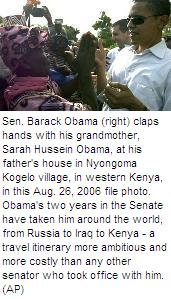
Commentary: Obama Fuss Proves America’s More Ready for a Black President Than it Is for Black People
By: Tonyaa Weathersbee, BlackAmericaWeb.com
So, Barack Obama is officially in. And not unexpectedly, the disparagers have started in on him.
He's not experienced enough, say the ones who either are ignorant of, or don't want to give him credit for his several years in the Illinois Senate before being elected to the U.S. one.
He's not American enough, say the Sept. 11 opportunists who worry that the popularity of Obama, who attended a Muslim school as a child, might render their fear card useless. He's not black enough, say some black people who, after hearing endless punditry about being the black person that white people are most likely to love, see themselves as less lovable next to his kind of blackness.
But I'm glad that Obama is running. I'm glad because if nothing else, his candidacy will provide an update on the black condition in America. In the end, we'll learn whether this country is weary enough of the provincialism and narrowness that guided George W. Bush's presidency and got us stuck in a quagmire in Iraq to turn the country over to the intellectually superior and well-traveled Obama. We'll learn whether white people are capable of voting the way they say they will when they are polled regarding black candidates.
But most of all, we'll learn what it really takes for a black candidate to be elected to the nation's highest office. We'll learn whether it's really about experience, knowledge and charisma -- or whether it's about not being "too black."
The not-being-too-black thing bothers me.
Not because I believe Obama will feverishly avoid photo-ops with Al Sharpton or Jesse Jackson to avoid being labeled as such. Not because I believe his Harvard pedigree and his mixed-race background somehow makes him not one of us. If anything, that brother's accomplishments make me extremely proud that he is one of us.
What bothers me is that being "too black" often boils down to the subjectivity of white people -- many of whom now believe that things such as civil rights issues are no longer real, but exaggerations of angry blacks stuck in the past. Too many times, it boils down to the "good" black versus the "bad" black -- the good black, of course, being the black who deals with black problems if asked, and the bad black being the one who doesn't wait to be asked.
What that means is that to get white votes, black candidates like Obama might be faced with having to make them comfortable at the expense of making black people invisible. And while I'm not saying that Obama will do this -- or is doing this -- many times the expectations tend to come down to this.
Managing such expectations can be tricky. Just ask Colin Powell.
Throughout the 1990s the former Secretary of State, who was riding a wave of success after the first Gulf War, was being widely touted as presidential timber. As with Obama, the not-too-black thing -- as well as his military pedigree -- was seen as being a major trait that would work in his favor.
But even though Powell never ran for president, I often wonder what would have happened if Powell had dared to be a "bad" black person when he was Secretary of State. I wonder if, instead of going along with George W. Bush's rush to war in Iraq when he knew it wasn't the right thing to do, as Washington Post journalist Bob Woodward wrote in his book about the war, he had gone public in his push to see where the sanctions led.
I wonder how many lives, black lives included, would have been saved if Powell had just quit being a soldier and started being a warrior.
Of course, Obama is no Powell. The fact that he is daring to run for president in the first place says that. And the only way to find out if America is ready for a black president is for a black person to run.
Yet, while I can't help but worry that the "not-too-black" stuff that speaks to Obama's appeal among white voters underscores the struggle that blacks still face in America; that black people have to constantly cover for being black in order to be accepted. What that means, in many instances, is that you cover your pain so as not to offend those who may be responsible for causing the conditions that led to that pain.
If Obama is elected, that pain will still be there. And while his victory would say that America is ready for a black president, it won't necessarily mean that it is ready for black people.
And that's what's sad.

No comments:
Post a Comment